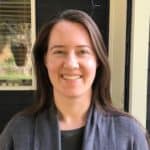 In those days Mary set out and went with haste to a Judean town in the hill country, where she entered the house of Zechariah and greeted Elizabeth. When Elizabeth heard Mary’s greeting, the child leaped in her womb. And Elizabeth was filled with the Holy Spirit and exclaimed with a loud cry, “Blessed are you among women, and blessed is the fruit of your womb. And why has this happened to me, that the mother of my Lord comes to me? For as soon as I heard the sound of your greeting, the child in my womb leaped for joy. And blessed is she who believed that there would be a fulfillment of what was spoken to her by the Lord.” – Luke 1:39-45 (NRSV)
In those days Mary set out and went with haste to a Judean town in the hill country, where she entered the house of Zechariah and greeted Elizabeth. When Elizabeth heard Mary’s greeting, the child leaped in her womb. And Elizabeth was filled with the Holy Spirit and exclaimed with a loud cry, “Blessed are you among women, and blessed is the fruit of your womb. And why has this happened to me, that the mother of my Lord comes to me? For as soon as I heard the sound of your greeting, the child in my womb leaped for joy. And blessed is she who believed that there would be a fulfillment of what was spoken to her by the Lord.” – Luke 1:39-45 (NRSV)
Can you imagine being Mary, as she sets out for the Judean hill country? An angel has just told you that you―you, in your small town in the middle of nowhere, in your youth, in your vulnerability and societal insignificance as an unmarried woman―you are going to miraculously give birth to a king, the holy Son of God.
What do you do with this life-disrupting news? Who do you talk to, there in your small hometown, full of people who expect pregnancy to work in the usual way?
Mary remembered that her older relative Elizabeth was also pregnant. So she embarked on a journey―a dangerous journey, three to five days, roads full of robbers, apart from her family, fiancé, and community.
This took so much courage. I imagine her thinking, This is all so unexpected, and incredible, and terrifying, and complicated. I don’t know if anyone will understand. But if anyone could, maybe it’s Elizabeth.
It was the only thing to do.
People on the margins are often people on the move. They take risks and seek safe places to stay, communities who will welcome them. And God is with all those desperate enough to make dangerous journeys.
Mary arrived and greeted Elizabeth, who was marginalized in her own way. Like her husband, Zechariah, she came from a priestly line (Luke 1:5); but unlike Zechariah, as a woman, she was not allowed to be a priest.
Additionally, Elizabeth was blamed for her and Zechariah’s childlessness. When she became pregnant, she said, “The Lord has shown his favor and taken away my disgrace among the people” (Luke 1:25). For Elizabeth, infertility was not only a source of sadness, disappointment, and vulnerability in old age, but it was also a social disgrace. People likely assumed there was some sort of sin in her life. What was wrong with her? What awful thing had she done? They may have whispered behind her back, and perhaps in her darker moments, Elizabeth whispered these things to herself, too.
In a world where marginalized women were supposed to disappear into the background, Mary and Elizabeth took up space. They took up space in Luke’s narrative―and in the story of God’s love and redemption in the world.
Mary’s greeting reached Elizabeth’s ears, and little John the Baptist did a jump for joy. Elizabeth was then filled with the Holy Spirit.
This exact language―“filled with the Holy Spirit”―is used only a few other times in the New Testament. An angel said John the Baptist would be filled with the Holy Spirit from his mother’s womb. Zechariah was filled with the Holy Spirit, speaking his own prophetic poem. The group of believers at Pentecost were filled with the Holy Spirit and spoke in other languages. Peter and Paul were each filled with the Holy Spirit in parts of Acts, often when they had something especially bold to say.
Elizabeth joined the ranks of men like John the Baptist, and Zechariah, and Peter, and Paul in being filled with the Spirit and speaking boldly.
Luke used three different Greek words to express how intense Elizabeth’s voice was. She “exclaims”―she spoke out, or cried aloud. Her voice was “loud”―or, literally, “great.” And it sounded like a “cry”―or, alternatively, an outcry, or clamor.
Elizabeth’s cry was a fighting cry―a loud clamor. And it was holy, full of the Holy Spirit. It was bold and prophetic and true and important―and very unladylike. Women today―especially those on the margins―are often socialized to get along. We’re told to not make waves or be loud. We are told to hold our tongue, speak gently and quietly, and defer to others.
But when the Holy Spirit filled Elizabeth, she broke out of the confines of respectable behavior. She had something important to say and didn’t have time to make sure her voice was gentle enough and her words were inoffensive enough .
Maybe we’re rooting for Elizabeth here. Maybe we’re thinking, Yes! Speak your truth! Speak up and keep speaking!
And yet, for those of us who carry privilege in our bodies, is this how we respond when those who are marginalized today speak boldly and long for justice? Or do we expect them to conform to our images of respectability before we will listen?
These words that Elizabeth spoke were a series of blessings. You have been blessed among women. The fruit of your womb has been blessed. Although not allowed to be a priest, Elizabeth embodied the priestly role of pronouncing blessing. She recognized God’s incredible work in Mary’s life and named it as such.
For those of us on the margins, do we see ourselves as priestly people, empowered by God to boldly call forth the best in ourselves, in others, and in our world?
We live in exhausting, hopeful, revealing times. God is still speaking through prophetic voices from the margins today. In this new year, may we listen well to their challenging, life-giving, disruptive, world-altering words. May we bless one another.
 Liz Cooledge Jenkins is a writer, preacher, chaplain, and former college campus minister who lives in Burien, WA. She has a BS in Symbolic Systems from Stanford University and an MDiv from Fuller Theological Seminary. She regularly posts justice-minded biblical reflections, poems, “super chill book reviews,” and more at lizcooledgejenkins.com; she can also be found on FB (Liz Cooledge Jenkins, Writer) and Instagram (@lizcoolj). Her sermon on Ruth and Boaz was included in Sojourners’ collection of immigration sermons, El Camino.
Liz Cooledge Jenkins is a writer, preacher, chaplain, and former college campus minister who lives in Burien, WA. She has a BS in Symbolic Systems from Stanford University and an MDiv from Fuller Theological Seminary. She regularly posts justice-minded biblical reflections, poems, “super chill book reviews,” and more at lizcooledgejenkins.com; she can also be found on FB (Liz Cooledge Jenkins, Writer) and Instagram (@lizcoolj). Her sermon on Ruth and Boaz was included in Sojourners’ collection of immigration sermons, El Camino.


